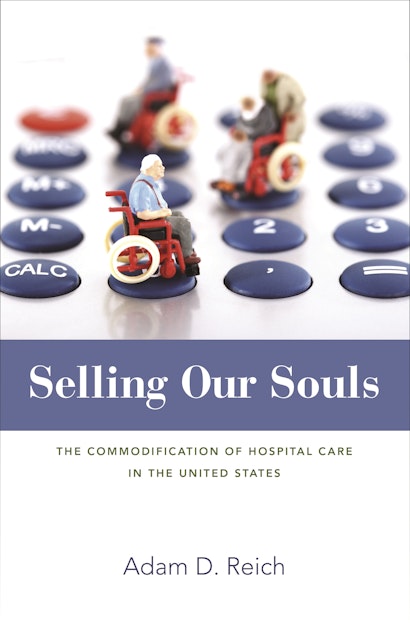Health care costs make up nearly a fifth of U.S. gross domestic product, but health care is a peculiar thing to buy and sell. Both a scarce resource and a basic need, it involves physical and emotional vulnerability and at the same time it operates as big business. Patients have little choice but to trust those who provide them care, but even those providers confront a great deal of medical uncertainty about the services they offer. Selling Our Souls looks at the contradictions inherent in one particular health care market—hospital care. Based on extensive interviews and observations across the three hospitals of one California city, the book explores the tensions embedded in the market for hospital care, how different hospitals manage these tensions, the historical trajectories driving disparities in contemporary hospital practice, and the perils and possibilities of various models of care.
As Adam Reich shows, the book’s three featured hospitals could not be more different in background or contemporary practice. PubliCare was founded in the late nineteenth century as an almshouse in order to address the needs of the destitute. HolyCare was founded by an order of nuns in the mid-twentieth century, offering spiritual comfort to the paying patient. And GroupCare was founded in the late twentieth century to rationalize and economize care for middle-class patients and their employers. Reich explains how these legacies play out today in terms of the hospitals’ different responses to similar market pressures, and the varieties of care that result.
Selling Our Souls is an in-depth investigation into how hospital organizations and the people who work in them make sense of and respond to the modern health care market.
Awards and Recognition
- One of Choice's Outstanding Academic Titles for 2015
"This book is an important resource for academic audiences and professionals in the health disciplines as well as those in the social sciences."—Choice
"Kudos to Adam Reich for this well-researched book! Students of medical sociology, as well as health management and policy, will find Selling Our Souls useful."—Okori Uneke, Ph.D., International Social Science Review
"Reich has written an excellent book."—Hengameh Hosseini, Political Science Quarterly
"This exceptionally clear and lively book takes us deep into the heart of the American health care system to observe how doctors, nurses, and administrative staffs in three hospitals respond to market pressures. Selling Our Souls brings to light these institutions' diverse moral-economic contradictions, shaped by their foundational ideals and different resource bases. May this nuanced and comprehensive depiction of the present provide a greater understanding for the future."—Marion Fourcade, University of California, Berkeley
"Analytically sophisticated and deeply humane, Adam Reich's Selling Our Souls takes us inside three worlds of hospital care. No one has done a better job showing how differences in institutions affect the moral life of American medicine today. This is a book that needed to be written and demands to be read."—Paul Starr, Pulitzer Prize-winning author of The Social Transformation of American Medicine
"A lucid investigation into the mission of health care versus the market of health care in three representative examples: a public hospital, a Catholic hospital, and a managed care hospital. The complexities and contradictions of the increasing commodification of health care and hospitals are skillfully and engagingly examined."—Charles Perrow, author of Normal Accidents
"Dispatching a distress signal about contemporary hospitals, Selling Our Souls is a smart observational study of the uneasy bind in American health care between caring for patients and catering to profits. In rich detail, Reich denotes how soaring overall spending incentivizes institutions to balance professional, commercial, scientific, and religious priorities."—Stefan Timmermans, University of California, Los Angeles
"Can markets ever be moral? Adam Reich's eye-opening study of hospital care brings fresh theoretical insight to the tense relationship between economic concerns and health care. Drawing from his close observation of three hospitals, Reich makes an innovative contribution to medical and economic sociology. The book's lessons will captivate not only scholars and policymakers but also patients everywhere."—Viviana A. Zelizer, author of Economic Lives
"This account of the dramatic differences in the organization of health care across three hospitals in one city is a significant addition to our understanding of how the health care system succeeds or fails. The fieldwork, interviews, and observations are absolutely stellar. The book is unique in illuminating both the commoditization of healthcare and resistance to it."—Fred Block, University of California, Davis
"Today's American hospitals face many pressing concerns regarding solvency, dealing with the uninsured and underinsured, controlling overtreatment, and managing relationships among various personnel. This accessible book provides a close-up view of how three hospitals manage these issues to function within legal and market constraints, and offers a vivid picture of hospital organization in modern America."—Michael Sauder, University of Iowa

